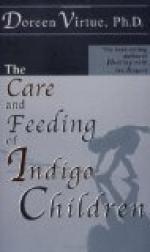Mumps is not very common in young children, and in them it is usually mild. After twelve or thirteen years it is likely to be more severe.
How long after exposure do the first symptoms appear in the different diseases?
In scarlet fever in from three to five days, rarely later than a week; in measles in from nine to fourteen days, occasionally as late as twenty days; in whooping-cough in from one to two weeks; in chicken-pox in from fourteen to sixteen days; in German measles in from ten to sixteen days. In diphtheria the time varies much; it may be only one day, and it may be one or two weeks. In mumps it is usually a little less than three weeks, the average being twenty days.
Which of these diseases are most contagious?
Measles and chicken-pox are very contagious, and very few children who have not had them can come near a person suffering from either disease without taking it. Whooping-cough is almost as contagious as measles, and for young babies even more so. A very close exposure is not necessary in the case of either of these diseases, and whooping-cough can undoubtedly be contracted in the open air. Scarlet fever and diphtheria are much less contagious; for both of these a pretty close exposure is necessary.
How long should a child with any of these diseases be kept away from other children?
With measles, for two weeks after the rash has gone; with scarlet fever, for at least four weeks after the rash has gone, and longer if the peeling is not over or if the ears are running; with whooping-cough, for two months, or so long as the paroxysmal cough continues; with chicken-pox, until all crusts have fallen off, or for about three weeks after the eruption appears; with German measles for one week after the eruption has faded; with diphtheria, at least ten days after the throat is well in a very mild case, and four weeks if the case has been severe; with mumps for one week after the swelling has gone.
What should be done when a child shows the first symptoms of serious illness?
The child should be put to bed. If it is an infant the food should be diluted to one half the usual strength; if an older child, only fluid food should be given. If the child seems feverish, take the temperature If the bowels are constipated, give a teaspoonful of castor oil; but no other medicine without the doctor’s orders. Send for the doctor at once, and until he comes carefully exclude all other children from the room.
By what nursery training may the examination and treatment of sick children he made much easier?
By teaching all children to gargle, to show the throat, to take pills, and by constantly teaching them to regard the doctor as the child’s best friend, and his visits as a great treat. On no account should a child be frightened into obedience by threats of what the doctor will do.
With care and patience most children may be taught to gargle and take pills at four or five years, and to show the throat willingly at two or three. All these matters should be made a part of the child’s education.




